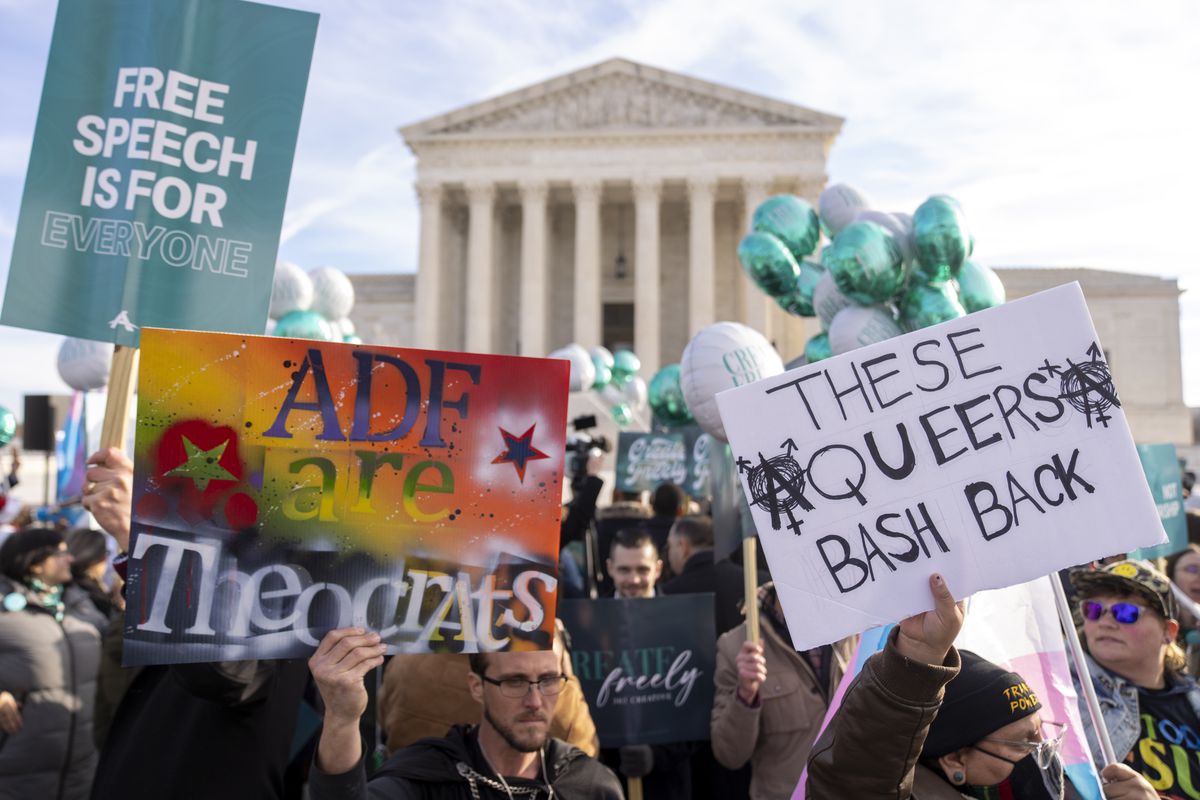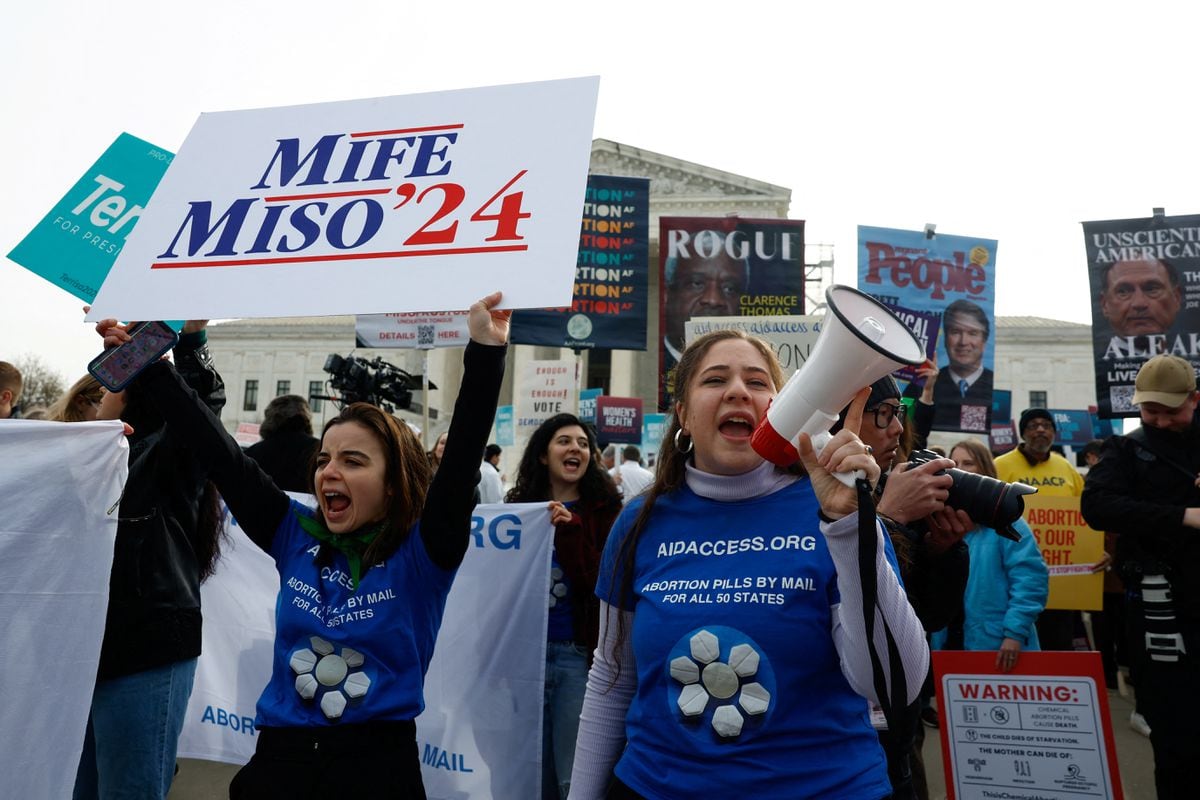The atmosphere at the gates of the United States Supreme Court this Monday was that of big cases.
Conservative organizations and LGTBIQ+ activists demonstrated outside while inside a case was discussed in which religious beliefs and the rights of homosexual couples conflict.
The Supreme Court, with a clear conservative majority, seems to be inclined to support the Colorado web designer who refuses to provide her services for gay weddings despite the fact that the law of that State rejects discrimination based on sexual orientation.
However, it will be necessary to wait until June to find out where the diffuse border between the constitutionally protected freedom of expression and the illegal discrimination of minorities is drawn.
The court has examined an appeal from 303 Creative, the company of Lorie Smith, a 38-year-old evangelical Christian web designer who only believes in marriage as a union of a man and a woman.
Smith wants to deny her services for homosexual weddings and argues that no one can force her to do so by virtue of the freedom of expression enshrined in the First Amendment of the Constitution.
The case
(303 Creative LLC against Elenis)
has become an exponent of the culture wars that the Supreme Court with a conservative majority is willing to wage in its turn to the right, despite the fact that it is somewhat prefabricated.
Smith does not yet have a wedding website service and has not been commissioned by any gay couple.
But she says she wants to launch the service and post a warning outright refusing to serve clients for gay weddings, something Colorado law prohibits.
All parties have come to admit during the hearing on Monday that no one can force the designer to create a web page that transmits messages in favor of gay marriage.
But Smith refuses to provide the service even though she doesn't have to include those kinds of messages;
even if the design that she commissions is the same as another that she has already done for a heterosexual couple or includes only data such as the names of the spouses, place of celebration, accommodation options, the wedding list and other logistical details.
The limit of discrimination
The progressive judges have cornered Lorie's lawyer, who has incurred in errors and contradictions and has not been able to explain where the limit is set if it is allowed to discriminate for the sake of freedom of expression for personal beliefs.
Judge Sonia Sotomayor has been the most incisive.
If Smith is allowed to deny him services because he doesn't believe in gay marriage, “what happens if a designer doesn't believe in interracial weddings or doesn't believe handicapped people should be allowed to get married?”
Smith's lawyer has tried to argue that it is not about the clients but about the message.
That is to say, the designer admits homosexual clients for other orders that do not have to do with marriage.
The question is whether the mere fact of having to accept the hypothetical commission to design a web page for a gay wedding (even if the design does not have any ideological charge), somehow obliges her to spread an implicit message in favor of equal marriage .
The progressive judges have stressed that this concept of implicit message has never been admitted and have warned of the risk of opening that spigot.
In addition, they have indicated that it is not the web designer who invites and transmits a message, but rather the authors of the message are considered to be the contracting parties.
The session has been spent drawing the border between goods and services that include a message or speech (and protected by freedom of expression) and those that do not.
Thus, a speechwriter cannot be forced to accept a commission to argue against her convictions.
On the other hand, a company that rents chairs for wedding banquets cannot refuse to do so for a gay marriage.
The design of the web page is somewhere in between.
To questions from the conservative judge Samuel Alito, the Colorado lawyer, Eric Olson, has admitted a very graphic example.
Smith can market wedding web designs that say true marriage is between a man and a woman, but he can't turn down gay couples hiring him for his wedding.
Alito has told him that he's not going to have many gay clients who want to hire him, to which Olson has replied that he could also lose a lot of straight couples who don't share that message.
Also progressive Ketanji Brown Jackson has given another example: can a white Santa Claus in a shopping center be allowed to turn away black children who want to take a picture with him?
Alito has countered with another example: Can a black Santa on the other side of the mall be forced to take a photo with a kid dressed as the Ku Klux Klan?
The Colorado attorney has countered that anti-discrimination laws do not protect Ku Klux Klan costumes.
And one of the progressive judges has told him that in any case it would not matter if the disguised child was white or a boy, to which Alito has replied, in what seemed to be a joke and that has gone viral: "They look like lots of black kids in Ku Klux Klan costumes, all the time.”
The Supreme Court backed a Colorado pastry chef three years ago who refused to make a wedding cake for a gay couple, although it did not go into the merits of the matter.
This case has similarities and differences with that one, but there is a coincidence that its outcome may be more important, the doctrine on the extent to which religious and other beliefs can rely on freedom of expression to justify discriminatory actions.


/cloudfront-eu-central-1.images.arcpublishing.com/prisa/F5GRV7HUTZACRHBAVHSBBMKKFM.jpg)


/cloudfront-eu-central-1.images.arcpublishing.com/prisa/MZCWKR7O5JGBDHQ4B6SRZVJD4E.jpg)


/cloudfront-eu-central-1.images.arcpublishing.com/prisa/OADNJHA33STDSSDCLLQNLNFBWQ.jpg)
